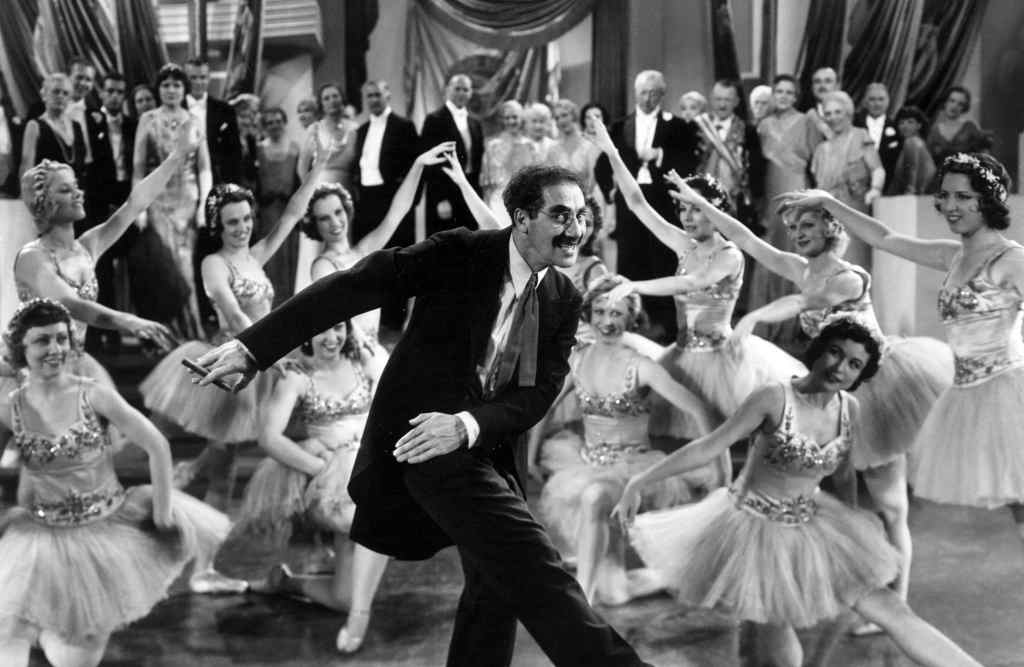
Secretary of Labor: The Department of Labor wishes to note that the workers of Freedonia are demanding shorter hours.
Rufus T. Firefly: Very well, we’ll give them shorter hours. We’ll start by cutting their lunch hour to 20 minutes.
—Duck Soup (1933)
Of the many great comedy teams in classic film, the Marx Brothers are ones who certainly stand out as notable sibling stars. With sharp, fast-paced dialogue, musical talents, and fantastic comedic rapport, their early films are just as enjoyable as ever. Duck Soup (1933) is one of their most applauded efforts, featuring many iconic scenes, as well as the fun and chaos that the Marx Brothers deliver in the world of fictitious Freedonia’s politics.
Written by Bert Kalmar and Harry Ruby and directed by Leo McCarey, four Marx brothers–Groucho, Harpo, Chico, and Zeppo–appear in this film. In addition to being the last Marx Brothers film to feature Zeppo, it would also be the final Paramount Pictures release of a Marx Brothers film. The film was produced by Herman J. Mankiewicz and included supporting stars Margaret Dumont, Louis Calhern, Raquel Torres, and Edgar Kennedy.
In the film, Groucho portrays Rufus T. Firefly, the newly-appointed president of a small and bankrupt country called Freedonia. Zeppo works alongside him as secretary Lt. Bob Roland, while Harpo and Chico, Pinky and Chicolini, are at odds with him. Both Pinky and Chicolini work as spies for Sylvania, a rival country. As tensions grow, Freedonia and Sylvania go to war.
Throughout the film, just about every character that interacts with Firefly is working in self-interest. Whether for the advancement or downfall of Freedonia, political friction is inevitable and certainly at its zaniest. The dialogue is as witty as ever, sparing no pains to poke fun at just about every character.
Rufus T. Firefly: Gentlemen, Chicolini here may talk like an idiot, and look like an idiot, but don’t let that fool you: he really is an idiot. I implore you, send him back to his father and brothers, who are waiting for him with open arms in the penitentiary. I suggest that we give him ten years in Leavenworth, or eleven years in Twelveworth.
Chicolini: I’ll tell you what I’ll do: I’ll take five and ten in Woolworth.
Minister of Finance: Here is the Treasury Department’s report, sir. I hope you’ll find it clear.
Rufus T. Firefly: Clear? Huh. Why a four-year-old child could understand this report. Run out and find me a four-year-old child, I can’t make head or tail of it.
Rufus T. Firefly: Remember, you’re fighting for this woman’s honor, which is probably more than she ever did.
Prosecutor: Something must be done! War would mean a prohibitive increase in our taxes.
Chicolini: Hey, I got an uncle lives in Taxes.
Prosecutor: No, I’m talking about taxes – money, dollars!
Chicolini: Dollars! There’s-a where my uncle lives! Dollars, Taxes!
After a barrage of personal insults and song-and-dance numbers to match the frenzy of anarchy, Duck Soup is a fast-paced jaunt through well-written pandemonium.
The full cast list is as follows:
- Groucho Marx as Rufus T. Firefly
- Harpo Marx as Pinky,
- Chico Marx as Chicolini
- Zeppo Marx as Lt. Bob Roland
- Margaret Dumont as Mrs. Gloria Teasdale
- Louis Calhern as Ambassador Trentino of Sylvania
- Raquel Torres as Vera Marcal
- Edgar Kennedy as the lemonade vendor
- Edmund Breese as Former President Zander
- Edwin Maxwell as Former Secretary of War
- William Worthington as First Minister of Finance
- Davison Clark as Second Minister of Finance
- Charles Middleton as prosecutor
- Leonid Kinskey as Sylvanian agitator
- Verna Hillie as Trentino’s secretary
- George MacQuarrie as first judge
- Fred Sullivan as second judge
- Eric Mayne as third judge
- Wade Boteler as officer at battle headquarters (uncredited)
- Carrie Daumery as reception guest (uncredited)
Duck Soup followed the release of Horse Feathers (1932), a popular Marx Brothers effort for Paramount. At the time, however, the studio was facing financial problems as well as changes in organizational structure, leaving the future for Marx Brothers films at the studio uncertain. Combining two potential Kalmar-Ruby scripts–Firecrackers and Cracked Ice–and adding in additional plots and scenarios, Duck Soup was born.
Previously, McCarer had used the title for an earlier silent short he worked on with Laurel and Hardy—Duck Soup (1927). The plots are completely different but the use of the title continued the allusion to animals in Marx Brothers films. At the time, the phrase “Duck soup” was slang for an easy task–ironically applied to the plot of the Marx Brothers film. The film, however, was influenced by a political play called Of Thee I Sing by George S. Kaufman, who had previously written two Marx Brothers stage plays.
Among the notable moments in the film is the famous “mirror scene” in which Pinky, disguised as Firefly, imitates Firefly’s reflection in a missing mirror. Harpo and Groucho are in synchronization for most of the bit, save for a few moments of in which audience belief is asked to be suspended for the sake of the well-executed gag. This type of routine did not originate in the film; Harold Lloyd and Max Linder used the routine in their past works, and the Marx Brothers themselves carried out the gag in their vaudeville days. The routine has since been used in many other films, television shows, and cartoons–including a version of the routine with Harpo Marx and Lucille Ball on I Love Lucy. Nonetheless, this silent routine is still memorable today and stands as a highlight of the film.
While Duck Soup did not perform as well as Horse Feathers, the film was not a flop. Though it was a disappointment for Paramount at the box office, potential reasons for the film’s lackluster reception include the fact that it was released during the Great Depression. Audiences were shocked to see politicians portrayed in such a zany and cynical way during a time of finncial and political crisis. MGM producer Irving Thalberg noted that there were no clear heroes to root for. While there was a love story, the brothers themselves play foolish and eccentric characters.
On a grander scale, the film was seen as a classic political farce and received strong reactions from different parts of the globe. Italian dictator Benito Mussolini banned the film in Italy, thinking it was a direct attack on him–much to the delight of the Marx Brothers. The residents of Fredonia, New York, protested the film’s setting, believing that the similar-sounding “Freedonia” would negatively impact the image of their town–to which the Marx Brothers suggested Fredonia change its name from affecting the success of film.
As for Groucho, the film did not innately hold a political meaning to him. When asked about the political significance of the film, he replied, “What significance? We were just four Jews trying to get a laugh.”
Today, Duck Soup remains a beloved classic among many Marx Brothers fans. The film has gone on to influence other artists; its impact can be seen in films like Bananas (1971) and Help! (1965), in addition to television spoofs such as the Animaniacs‘ “King Yakko” episode. Certainly unraveling as a political farce, the film also captures some of the most memorable–and hilarious–moments of the Marx Brothers.
This post is part of Classic Movie Bloggers Association‘s Fall 2020 Blogathon, entitled, “Politics on Film.”
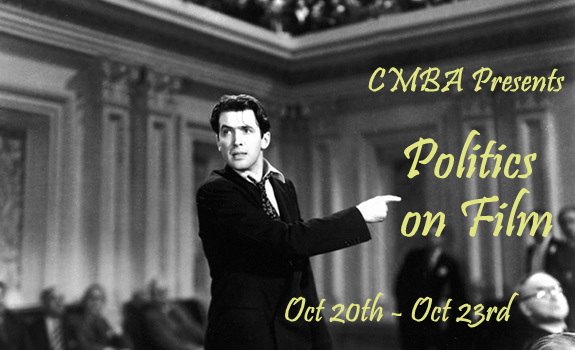



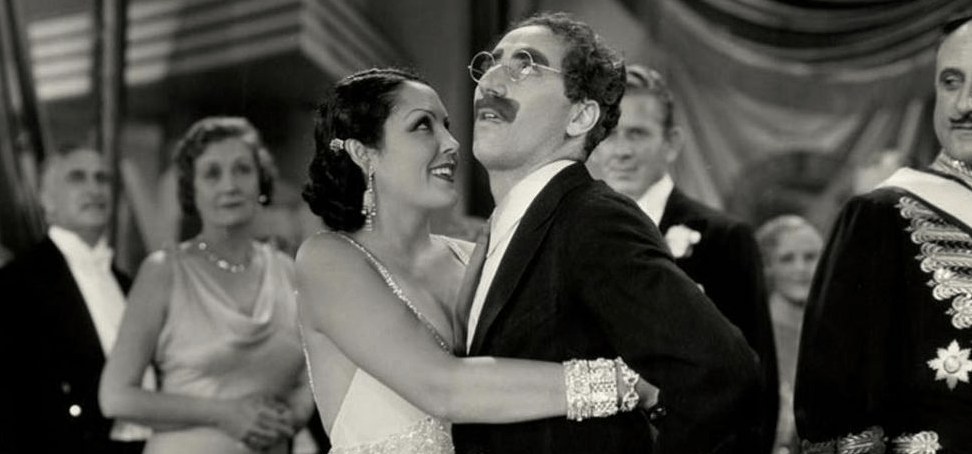

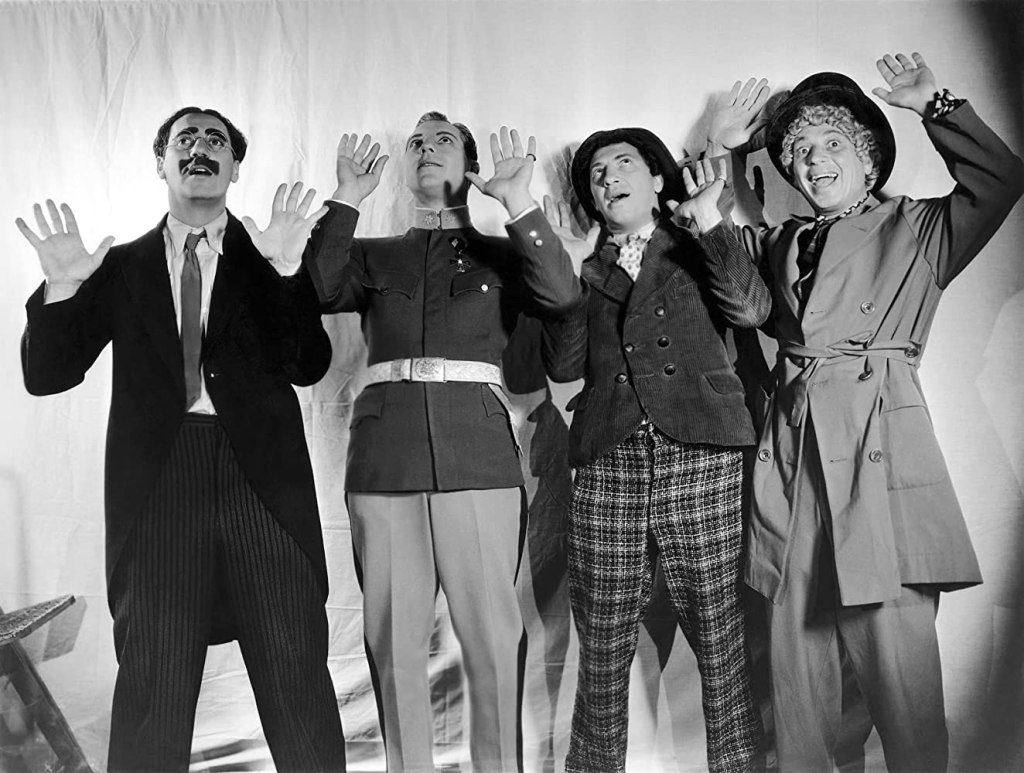


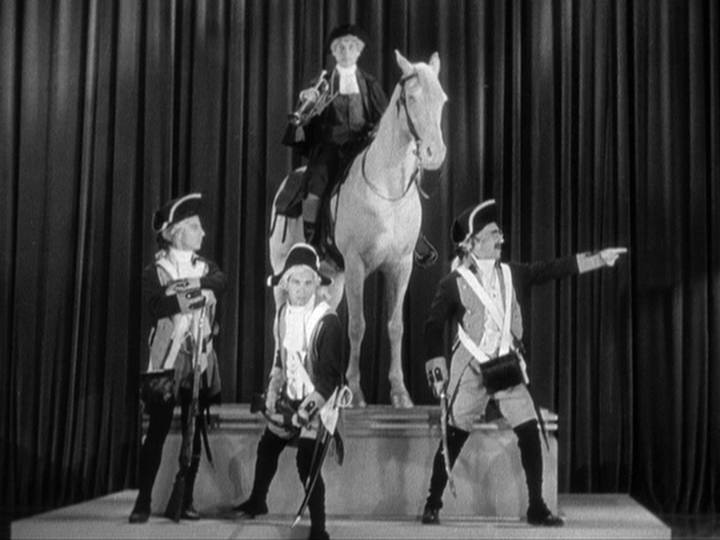
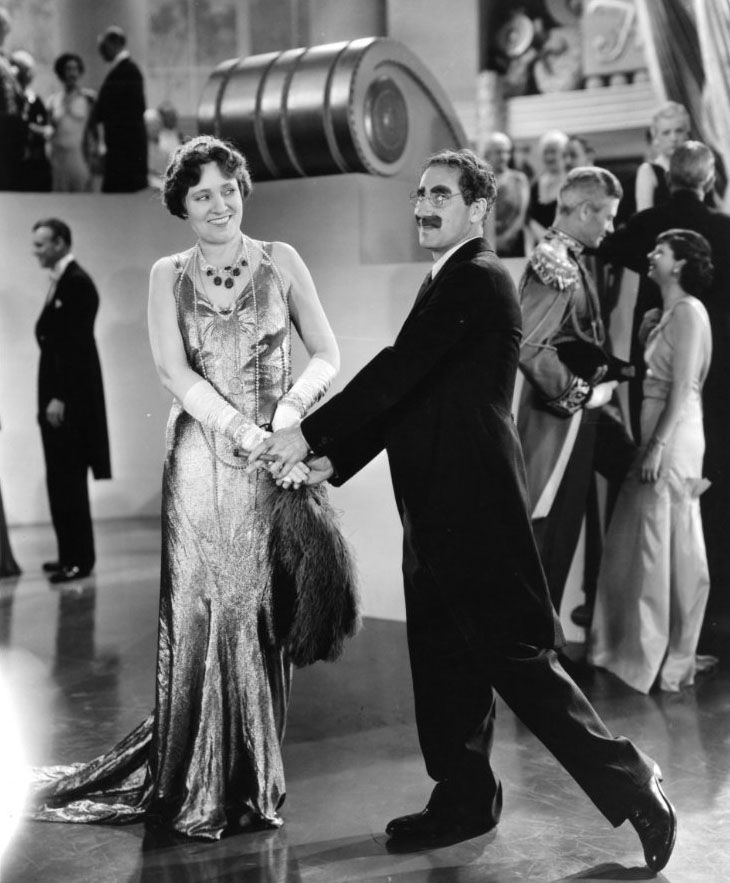
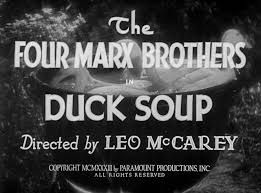
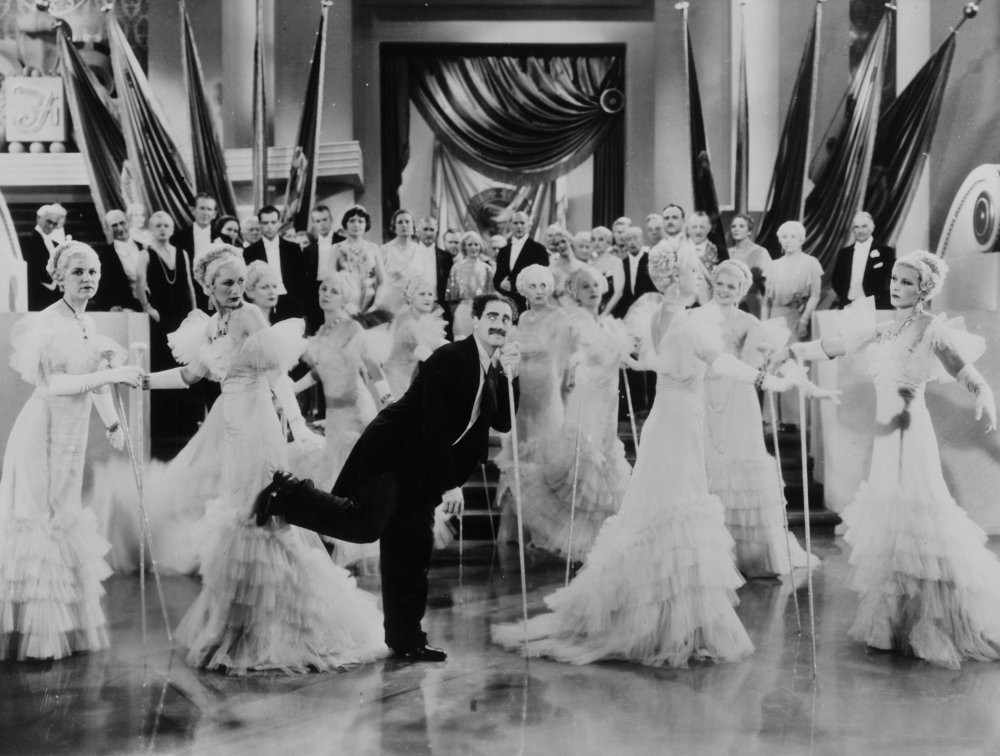
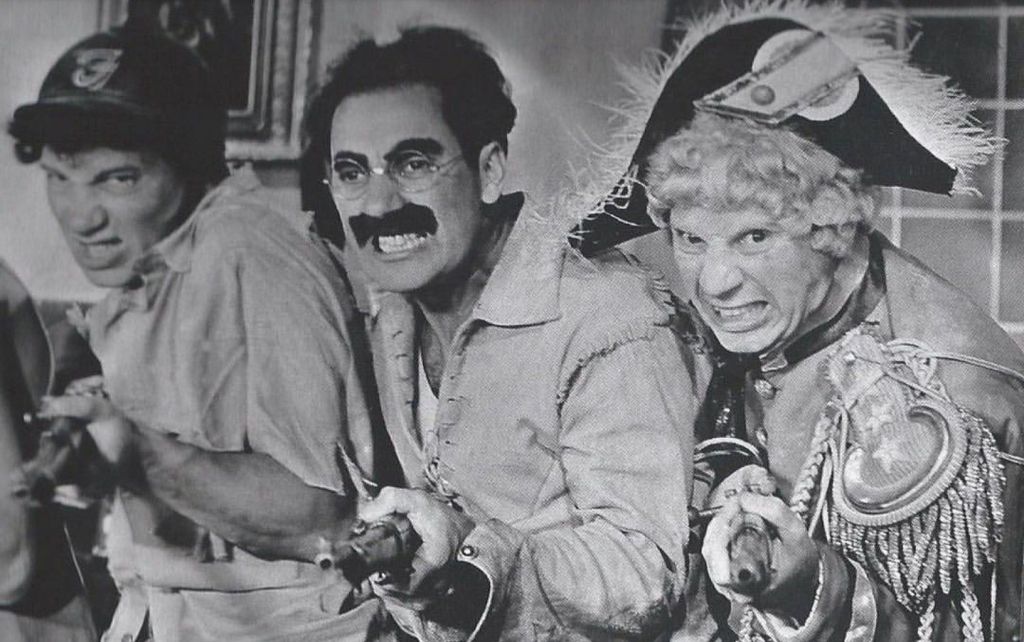
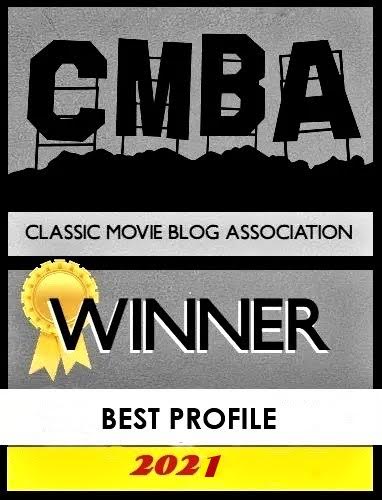





The fast-paced gags and the political satire truly made Duck Soup a movie for the ages.
“Harold Lloyd and Max Linder used the routine in their past works”
And let’s not forget Chaplin in “The Floorwalker” (1916)!